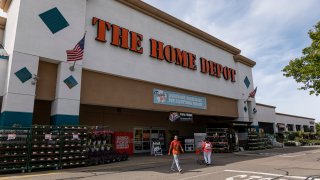
- Home Depot on Tuesday raised its full-year outlook after reporting solid quarterly earnings, fueled by the company's strongest first-quarter sales on record.
- For 2022, Home Depot is now expecting sales to increase about 3% and earnings per share growth in the mid single digits.
- This marks Ted Decker's first quarter at the helm of the company.
Home Depot on Tuesday raised its full-year outlook and reported strong quarterly earnings, fueled by the company's strongest first-quarter sales on record, an early signal that the retailer is so far weathering inflation.
Home Depot executives said they haven't seen shoppers trading down in the face of higher prices, and don't expect them to start.
Get Tri-state area news and weather forecasts to your inbox. Sign up for NBC New York newsletters.
For the fiscal year, the retailer is now expecting sales to increase about 3% and earnings per share growth in the mid single digits. The company previously forecast "slightly positive" sales growth and an earnings per share increase in the low single digits. Wall Street was expecting revenue growth of 1.8% and earnings per share growth of 3.6% for fiscal 2022.
Here's what Home Depot reported for the quarter ended May 1 compared with what Wall Street was expecting, based on a survey of analysts by Refinitiv:
- Earnings per share: $4.09 vs. $3.68 expected
- Revenue: $38.91 billion vs. $36.72 billion expected
The home improvement retailer reported fiscal first-quarter net income of $4.23 billion, or $4.09 per share, up from $4.15 billion, or $3.86 per share, a year earlier. Analysts surveyed by Refinitiv were expecting the company to earn $3.68 per share.
Money Report
Net sales rose 3.8% to $38.91 billion, topping expectations of $36.72 billion. Same-store sales increased 2.2% in the quarter.
U.S. same-store sales rose 1.7%, despite domestic same-store sales declines in March and April as the company faced tougher comparisons against last year's stimulus check sales boost and an earlier spring. A year ago, the company reported U.S. same-store sales growth of 29.9%.
"The strong performance in the quarter is even more impressive given the robust performance we were comparing against last year," CEO Ted Decker said on the company's conference call with analysts.
Weathering inflation
Decker said that the company hasn't seen the sensitivity to inflation that was initially expected.
Customer transactions fell 8.2% but were offset by higher sales amid inflationary pricing. The company's average ticket climbed 11.4%, and customers were still willing to trade up for premium products. Transactions of at least $1,000 increased 12.4% in the quarter.
Sales to professionals outpaced those for do-it-yourself projects. Kitchen and bathroom installation and building materials were among the categories that saw double-digit growth, likely thanks to that trend.
"While we don't know how inflation might impact consumer behavior going forward, we are closely monitoring elasticities and customer trends across our respective categories and geographies and remain encouraged by the underlying strength we see in the business," he said.
This marks Decker's first quarter at the helm of the company. Decker, a longtime Home Depot veteran, previously served as chief operating officer and inherited the top job at a tough time for home improvement.
Many consumers spent the early days of the coronavirus pandemic painting their walls, buying new patio furniture and taking care of other do-it-yourself projects that won't need to be repeated for at least a few years. Persistent inflation may lead consumers to put off renovation projects.
Additionally, rising interest rates could result in a slowdown in the hot housing market. So far, however, Home Depot executives said consumers who are considering a move are now more tempted to stay in their current low fixed-rate mortgages and remodel their homes instead.
"We believe that the medium-to-longer term underpinnings of demand for home improvement have never been stronger," Decker said.






